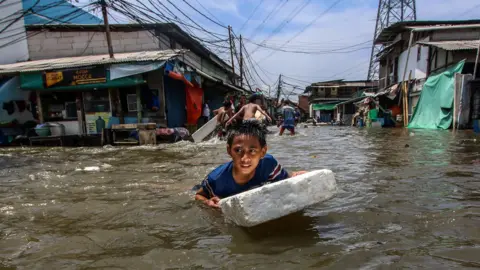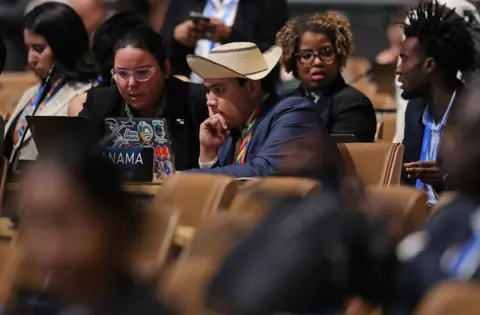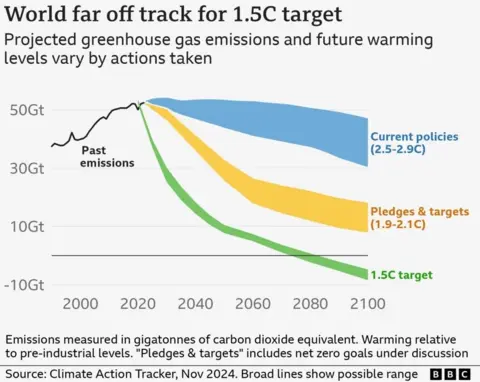 Eko Siswono Toyudho/Getty Photographs
Eko Siswono Toyudho/Getty PhotographsRicher nations have pledged to provide a report $300bn (£238bn) to the creating world to assist them put together for and stop local weather change.
The talks on the UN local weather summit COP29 in Azerbaijan ran 33 hours late, and got here inside inches of collapse.
The top of the UN local weather physique, Simon Stiell, mentioned it had “been a tough journey, however we have delivered a deal.”
However the talks didn’t construct on an settlement handed final yr calling for nations to “transition away from fossil fuels”.
Growing nations, in addition to nations which might be significantly susceptible to local weather change, dramatically walked out of the talks on Saturday afternoon.
“I’m not exaggerating after I say our islands are sinking! How will you anticipate us to return to the ladies, males, and youngsters of our nations with a poor deal?” mentioned the chair of the Alliance of Small Island States, Cedric Schuster.
However at 03:00 native time on Sunday (23:00 GMT on Saturday), and after some modifications to the settlement, nations lastly handed the deal. It was met with cheers and applause, however a livid speech from India confirmed that intense frustration remained.
“We can’t settle for it… the proposed objective won’t remedy something for us. [It is] not conducive to local weather motion that’s essential to the survival of our nation,” Leela Nandan informed the convention, calling the sum too small.
Then nations together with Switzerland, Maldives, Canada and Australia protested that the language about decreasing international use of fossil fuels was too weak.
As an alternative, that call was postponed till the following local weather talks in 2025.
This promise of more cash is a recognition that poorer nations bear a disproportionate burden from local weather change, but additionally have traditionally contributed the least to the local weather disaster.
The newly-promised cash is anticipated to return from authorities grants and the non-public sector – banks and companies – and will assist nations transfer away from fossil gasoline energy to utilizing renewable power.
There was additionally a dedication to tripling the cash that goes in direction of getting ready nations for local weather change. Traditionally, solely 40% of the funding obtainable for local weather change has gone in direction of this.
In addition to the promise of $300bn (£238bn), nations agreed that $1.3tn is required by 2035 to additionally assist stop local weather change.
This yr – which is now “nearly sure” to be the warmest on report – has been punctuated by intense heatwaves and lethal storms.
The opening of the talks on 11 November was dominated by the election of US President Donald Trump, who will take workplace in January.
He’s a local weather sceptic who has mentioned he’ll take the US out of the landmark Paris settlement that in 2015 created a roadmap for nations to deal with local weather change.
“For positive it introduced the headline quantity down. The opposite developed nation donors are acutely conscious that Trump won’t pay a penny and so they should make up the shortfall,” Prof Joanna Depledge, an skilled on worldwide local weather negotiations at Cambridge College, informed the BBC.
Reaching this deal is an indication that nations are nonetheless dedicated to working collectively on local weather, however with the biggest financial system on the planet now unlikely to play an element, it would grow to be tougher to fulfill the multi-billion greenback objective.
“The protracted finish sport at COP29 is reflective of the tougher geopolitical terrain the world finds itself in. The result’s a flawed compromise between donor nations and essentially the most susceptible nations on the earth,” mentioned Li Shuo from the think-tank Asia Society Coverage Institute.
UK Power Secretary Ed Miliband confused that the brand new pledge doesn’t commit the UK to provide you with extra local weather finance nevertheless it was really a “big alternative for British companies” to put money into different markets.
“It is a essential eleventh hour deal on the eleventh hour for the local weather. It’s not the whole lot we or others wished however it’s a step ahead for us all,” he mentioned.
In return for promising more cash, developed nations together with the UK and the European Union wished stronger commitments by nations to scale back use of fossil fuels.
Regardless of their hopes that the settlement struck on the talks in Dubai final yr to “transition away from fossil fuels” can be strengthened, the ultimate proposed settlement solely repeated it.
For a lot of nations this was simply not ok, and it was rejected – it would now need to be agreed subsequent yr.
Nations that depend on oil and gasoline exports reportedly put up a powerful battle in negotiations to cease additional progress.
“The Arab Group won’t settle for any textual content that targets particular sectors, together with fossil fuels,” Saudi Arabia’s Albara Tawfiq mentioned at an open assembly earlier this week.
 Sean Gallup/Getty Photographs
Sean Gallup/Getty PhotographsA number of nations got here to the talks with new plans to deal with local weather change in their very own nations.
Prime Minister Keir Starmer made a play for local weather management on the world stage and pledged to scale back UK emissions by 81% by 2035, which was celebrated by many as an formidable objective.
The host nation, Azerbaijan, was a controversial selection for local weather talks. It says it needs to develop gasoline manufacturing by as much as a 3rd within the subsequent decade.
Brazil is seen as a better option to host subsequent yr’s local weather summit, COP30, within the metropolis of Belém due to President Lula’s robust commitments to local weather change and decreasing deforestation within the globally vital Amazon rainforest.





